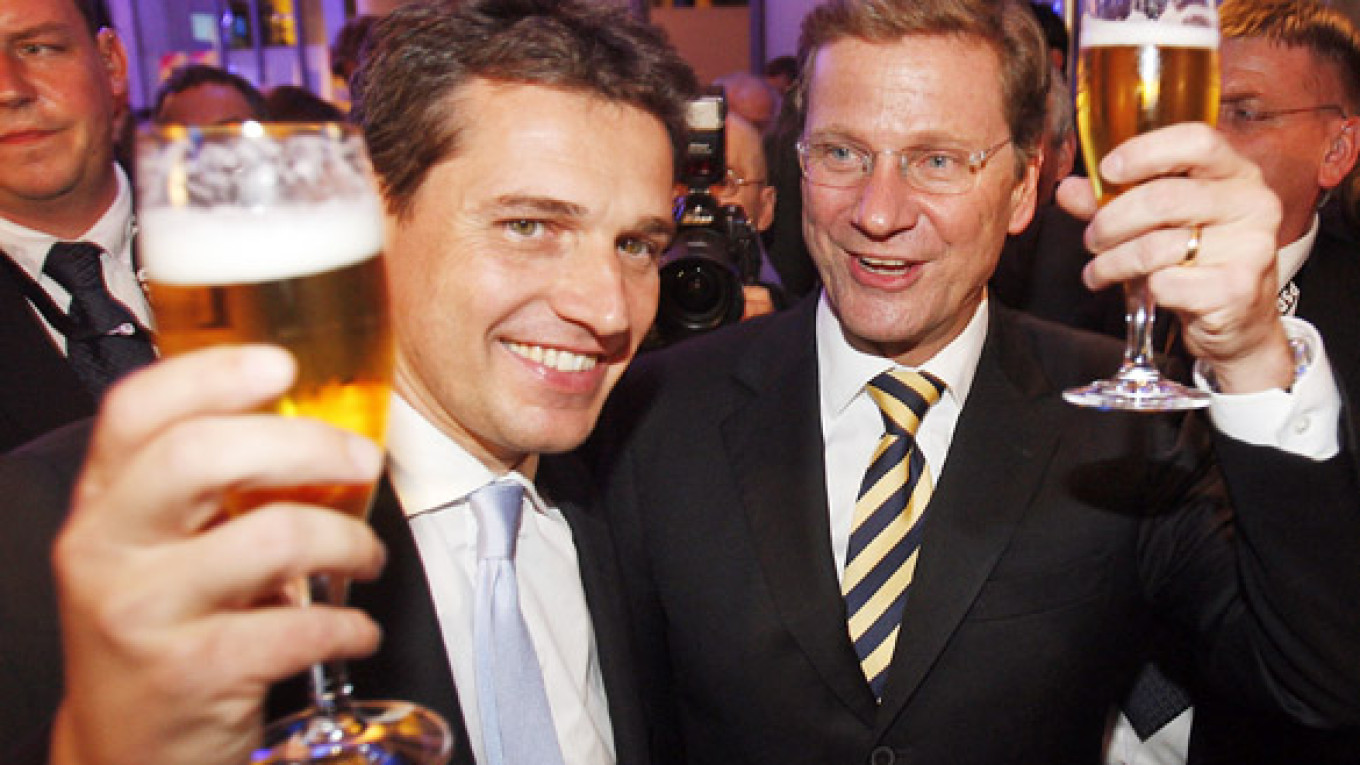Russian opposition activists celebrated German election results Monday, saying that with the Social Democrats gone, Berlin will hopefully take a more critical stance toward Moscow.
Analysts cautioned, however, that any significant shift in policy was unlikely as long as Angela Merkel remained chancellor.
“Good news from Berlin: Putin’s friends lost the election,” tweeted Vitaly Averin, a 25-year-old blogger from Ivanovo, as the results of Germany’s general election came in.
The jab was directed at the leftist Social Democrats, whose share of the vote slumped from 34 percent to 23 percent in Sunday’s vote, the biggest loss for the party since World War II. Its campaign was lead by Foreign Minister Frank-Walter Steinmeier, a close ally and longtime aide of former Chancellor Gerhard Schröder.
Schröder forged close ties with the Kremlin when Vladimir Putin was president and became chairman of the Gazprom-controlled Nord Stream pipeline consortium after losing the 2005 election. He and Steinmeier have often been portrayed as champions for the Kremlin’s interests in Europe.
Russian opposition activists said replacing Steinmeier as foreign minister could only mean improvement.
“Steinmeier was a major stumbling block for engaging the Kremlin. Anybody else in that post already is good news,” Denis Bilunov, a senior official with the The Other Russia movement headed by former chess champion Gary Kasparov, told The Moscow Times.
Oleg Orlov, head of the Memorial human rights group, said Steinmeier had prolonged Schröder’s policies on Russia, which he said were “extremely bad for civil society, democracy and the country as a whole.”
Yet little is known in Russia about Steinmeier’s most likely successor, Free Democrats leader Guido Westerwelle, whose party is set to form a coalition with Merkel’s Christian Democrats.
Westerwelle made some critical remarks about Moscow during the election campaign.
He mocked Schröder’s Nord Stream job, calling him “Germany’s gasman in Russia” who could not be trusted.
He also strongly criticized the deal to sell General Motor’s Opel division to Magna and Sberbank as being both a waste of taxpayers’ money and a handout to Moscow.
His party is comprised of outspoken critics of the Russian government’s meddling with corporate affairs, like Sabine Leutheusser-Schnarrenberger, who in June sent a damning report to the Council of Europe about Russia’s court system based on interviews in the Khodorkovsky case.
Sergei Mitrokhin, head of the liberal Yabloko party, said he was delighted about the prospect of working with Germany’s liberals, with whom he saw many areas in common.
“We share the same political colors, and I even hope we can influence their leaders a little,” he told The Moscow Times.
Mitrokhin said he would not mourn Steinmeier’s imminent departure because he had been “only interested in gas.”
Yet analysts cautioned that there was little reason to expect the new government in Berlin to move away from its previous stance toward Moscow, first and foremost because Merkel will continue to call the shots in German politics.
“The chancellor defines the government’s policy guidelines, and Ms. Merkel’s remaining in office will guarantee continuity,” said Betrand Malmendier, who runs the Berlin office of the Center for Social-Conservative Policy, a think tank belonging to Putin’s ruling United Russia party.
Malmendier recalled that similar talk that Merkel would adopt a Kremlin-critical stance when she assumed office four years ago has all but subsided. “Realpolitik has since strengthened German-Russian relations,” he said by telephone from Berlin, adding that Westerwelle would just make minor adjustments.
Alexander Rahr, a Russia expert with the German Council of Foreign Relations, said Merkel had become as Kremlin-friendly as her predecessor. “She has already become Schröderized, if I may say,” he said in an interview with Deutsche Welle Radio.
Westerwelle promised this himself when he told German magazine Der Spiegel in a wide-ranging interview earlier this year that he would “in principle” continue the foreign policy from the Merkel-Steinmeier coalition.
“There won’t be a turnaround, but we would set some new tones,” he said.
Westerwelle also suggested in the interview that he would not favor antagonistic policies toward Moscow, saying that the Conservative notion of Russia as a strategic enemy is “totally wrong” and that “Russia has a strong interest in a partnership with Germany and Europe.”
Party officials said Monday that the Free Democrats would probably let Magna’s purchase of Opel proceed. Before Sunday’s vote, Westerwelle had promised a review of the deal.
Vladislav Belov, a Germany expert at the Academy of Sciences European Center, said that the Free Democrats had a long tradition of supporting small and medium-sized business over big industry conglomerates, but that does not mean the party is anti-Russian.
“They are just liberal,” he said.
Westerwelle will also be the first German foreign minister who is openly gay, a fact that, Belov said, should not play any role in his dealings with Moscow, despite the country’s rampant homophobia.
“I think that Putin and [President Dmitry] Medvedev can handle that,” he said.
A Message from The Moscow Times:
Dear readers,
We are facing unprecedented challenges. Russia's Prosecutor General's Office has designated The Moscow Times as an "undesirable" organization, criminalizing our work and putting our staff at risk of prosecution. This follows our earlier unjust labeling as a "foreign agent."
These actions are direct attempts to silence independent journalism in Russia. The authorities claim our work "discredits the decisions of the Russian leadership." We see things differently: we strive to provide accurate, unbiased reporting on Russia.
We, the journalists of The Moscow Times, refuse to be silenced. But to continue our work, we need your help.
Your support, no matter how small, makes a world of difference. If you can, please support us monthly starting from just $2. It's quick to set up, and every contribution makes a significant impact.
By supporting The Moscow Times, you're defending open, independent journalism in the face of repression. Thank you for standing with us.
Remind me later.


